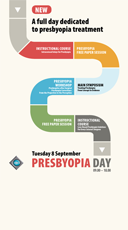Two year results of supraciliary micro-stent implantation in patients refractory to topical glaucoma therapy
(results will display both Free Papers & Poster)
Session Details
Session Title: Glaucoma II
Session Date/Time: Tuesday 08/09/2015 | 08:00-10:30
Paper Time: 08:46
Venue: Room 17
First Author: : J.Garcia Feijoo SPAIN
Co Author(s): : M. Rau S. Grisanti S. Grisanti H. Hoh C. Erb P. Guguchkova
Abstract Details
Purpose:
To assess the safety and clinical outcomes of supraciliary (SC) micro-stent implantation as a treatment for primary open-angle glaucoma (POAG) in patients refractory to topical glaucoma therapy.
Setting:
EU Multicenter study spread across 7 centers in Spain, Germany, Austria and Bulgaria.
My setting:
Hospital Clinico San Carlos, (IdSCC), Universidad Complutense. OFTARED (ISCIII),Madrid,Spain
Other:
University Eye Clinic, Salzburg, Austria
Specialized Hospital for Active Treatment of Ophthalmologic Diseases, Bulgaria, Sofia,
Schlosspark-Klinik, Department of Ophthalmology, Berlin, Germany
Augenklinik Cham, Cham, Germany
Klinik fur Augenheilkunde, Campus Luebeck, Luebeck, Germany
Klinik fur Augenheilkunde, Dietrich Bonhoeffer Klinikum, Neubrandenburg Germany
San Carlos Clinical Hospital, Madrid, Spain
Methods:
Subjects with diagnosed POAG (angles with Shaffer grade 3 or 4) and intraocular pressure (IOP) uncontrolled by topical medications (IOP ≥21 mmHg on 1 or more medications) underwent implantation of the CyPass Micro-Stent, a novel supraciliary implant. Glaucoma medications were discontinued at surgery and resumed at investigator discretion. Device was implanted using a transcameral, ab interno approach through a 1.5-mm clear corneal incision. Adverse events, postoperative IOP changes, and need for IOP-lowering medications during the first 24 postoperative months (24M) were monitored.
Results:
Sixty-five subjects (eyes) were enrolled in the study. All devices were implanted successfully without any major intraoperative complications. During 2 years of follow-up, there were no major sight-threatening complications related to device implantation. Baseline mean ± SD medicated IOP was 24.4 ± 2.9 mmHg. At 12M and 24M, IOP was 16.7 ± 5.5 mmHg (32% reduction) and 16.5 ± 3.5 mmHg (31% reduction), respectively. Medication use also decreased from a mean of 2.2 medications to 1.7 medications at 24M. Secondary glaucoma surgery (trabeculectomy) was avoided in 75% of subjects.
Conclusions:
The CyPass Micro-Stent provided safe and sustained IOP reduction over a 24-month period in POAG patients refractory to topical medications and may avoid the need for conventional glaucoma surgery in the majority patients.
Financial Interest:
One of the authors research is funded, fully or partially, by a company producing, developing or supplying the product or procedure presented





